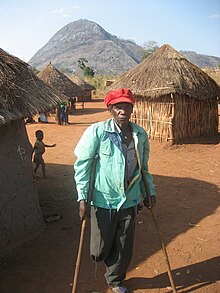Mozambique Civil War
| Mozambican Civil War | |||||||
|---|---|---|---|---|---|---|---|
| Part of the Cold War | |||||||
 Victim of land mines set up during the war. |
|||||||
|
|||||||
| Belligerents | |||||||
|
|
|
||||||
|
Supported by:
|
Supported by:
|
||||||
| Commanders and leaders | |||||||
|
|
|
||||||
| Strength | |||||||
|
|
~20,000 | ||||||
| Casualties and losses | |||||||
|
|
Unknown | ||||||
| Total killed: ~1,000,000 (including from famine) | |||||||
The Mozambican Civil War began in 1977, two years after the end of the war of independence. It resembled the Angolan Civil War in that both were proxy wars of the Cold War that started soon after the countries gained independence from Portugal. The ruling party, Front for Liberation of Mozambique (FRELIMO), and the national armed forces (FAM), were violently opposed from 1977 by the Mozambique Resistance Movement (RENAMO) which received funding from white-ruled Rhodesia and (later) apartheid South Africa. About one million people died in fighting and from starvation; five million civilians were displaced, and many were made amputees by landmines, a legacy from the war that plagued Mozambique for more than two decades afterward. Fighting ended in 1992 and the country's first multi-party elections were held in 1994. However, in 2013, after more than 20 years of peace, RENAMO insurgency resurged and is ongoing, resulting in dozens of deaths.
In the 1950s and 1960s Mozambican resistance to Portuguese colonial rule intensified, with gathering resentment of Portuguese authorities for centuries of exploitation, oppression and neglect. After a successful wave of independence movements in other African territories, Cold War powers and the international community started to urge Portugal to leave its territories in Africa. Sentiment for Mozambique's own national independence developed and on 25 June 1962 several Mozambican anti-Portuguese political groups formed the Mozambique Liberation Front (FRELIMO) in Dar-es-Salaam, Tanzania.
FRELIMO's first president was Eduardo Mondlane whose first objective was to forge a broad-based insurgent coalition that could effectively challenge the colonial regime. Anonymous private contributors, many of them friends of Mondlane, financed or secured money for FRELIMO's health, publicity, and educational projects, while military equipment and training came from Algeria, the Soviet Union and China.
...
Wikipedia
